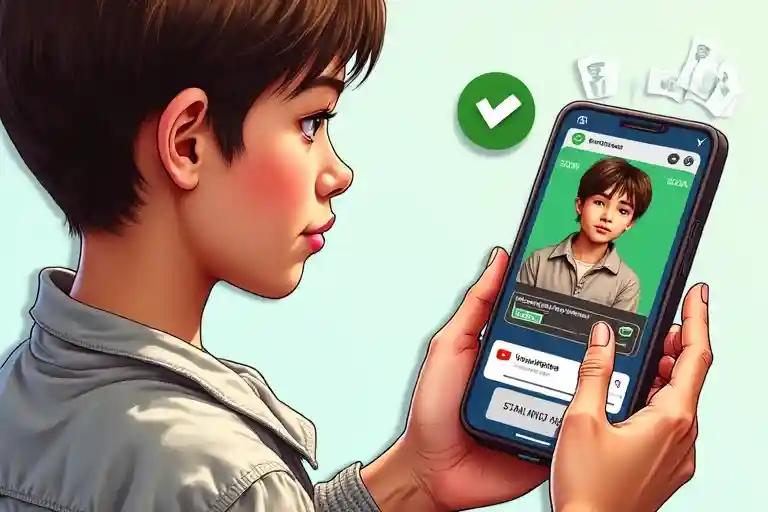Okay, let’s get real for a second. You have ideas. BIG ideas. Maybe you’re the go-to person in your friend group for movie reviews, you’ve created an entire fantasy world in your head, you’re a master at a video game, or you have a passion for sustainable fashion that could totally change the world. Your brain is buzzing with stuff you want to share, but shouting it into the void of your social media feed just feels… temporary. It gets buried in like, five minutes. What if you had your own corner of the internet? Your own headquarters?
That’s what a blog is. It’s your stage, your magazine, your personal brand headquarters. But starting one can feel like trying to solve a Rubik’s Cube in the dark. You hear words like “hosting,” “domains,” and “plugins,” and your brain just goes into full-on buffering mode. I’ve been there. My first attempt at a blog was a hot mess of confusing menus and code that looked like an alien language. But guess what? It doesn’t have to be that hard. At all.
We’re going to break down the absolute best blog platforms 2024 has to offer, especially for teens like you. We’ll ditch the boring technical jargon and talk about what actually matters: which platform is easiest to use, which one will make your content look amazing, and yes, which ones can even help you start making some cash on the side (with your parents’ okay, of course!). We’ll look at the big names, the free options, and find the perfect match for your voice. Ready to build your empire? Let’s do this.
Last updated: June 2025
Best blog platforms 2024 for beginners
Starting out is all about one thing: simplicity. You don’t want to be fighting with your tools; you want to be creating! If you’re a beginner, you need a platform that gets out of your way and lets you focus on your words, pictures, or videos. The goal is to go from idea to “PUBLISH” with the fewest headaches possible. These platforms are designed for exactly that. They are the definition of user-friendly and are some of the best platforms to start blogging.
Wix: The Drag-and-Drop Dream
Picture this: you’re constructing with LEGOs. You can see precisely wherein each piece is going, and you may flow them round until it seems perfect. That’s Wix. It’s a visible, drag-and-drop website builder that is SO pleasing to apply. You actually click on an element—a text container, an photograph, a video—and drag it anywhere you need at the page.
I helped my younger cousin installation a portfolio for her artwork, and she or he picked up Wix in approximately 20 mins. She had zero coding enjoy, however she became capable of construct a website that regarded incredible expert. It’s ideal for visual blogs (suppose fashion, food, artwork, or journey) as it gives you overall creative freedom without needing to understand a single line of code. It’s one of the most popular personal weblog sites for a cause.
- Who it’s for: The creative type who wants total control over the look and feel of their site without touching code.
- Pros: Insanely easy to use, tons of beautiful templates, and very flexible design-wise.
- Cons: The free plan has Wix ads, and you can’t switch templates once your site is live, so choose wisely!
Squarespace: The Template King
If Wix is LEGOs, Squarespace is a high-end interior designer. You don’t get to move every single wall, but the pre-designed rooms are so gorgeous you won’t want to. Squarespace is famous for its award-winning, stunningly clean and modern templates. Seriously, it’s hard to make a bad-looking website with Squarespace.
It’s a little less flexible than Wix in terms of drag-and-drop, using a more structured grid system, but that can actually be a good thing. It prevents you from accidentally making your site look messy. It’s like having guardrails that keep your design on track. For a sleek, professional-looking blog that you can set up in an afternoon, Squarespace is a top contender. For more insights on where to get started, you might find this guide on the best platforms to start a blog in 2025 helpful.
- Who it’s for: The blogger who prioritizes aesthetics and wants a polished, professional look right out of the box.
- Pros: Best-in-the-biz templates, all-in-one platform (hosting included), great mobile experience.
- Cons: No free plan (only a free trial), and it’s a bit pricier than other options.
Medium: For The Pure Writer
Wait a moment… what if you don’t care about templates, designs, or colors? What if you just want to write? Then you need to check out Medium. Medium isn’t a website builder; it’s a social publishing platform. Think of it like a giant, shared magazine where anyone can be a writer.
The editor is incredibly minimalist—it’s just you and a blank page. The magic of Medium is its built-in audience. When you publish an article, it can be recommended to thousands of people who are already interested in your topic. You’re not starting from zero. It’s an amazing way to test your ideas and see what resonates with readers before you even think about building a whole website.
- Who it’s for: The writer who wants to focus 100% on their message and tap into a pre-existing community of readers.
- Pros: Zero setup required, potential for a huge built-in audience, clean and beautiful reading experience.
- Cons: No design customization, you don’t own your “site” (it’s a profile on their platform), and monetization is limited to their Partner Program.

Best blog platforms 2024 free
Let’s talk about everyone’s favorite price: FREE. Starting a blog shouldn’t require you to empty your piggy bank. Luckily, there are some fantastic, powerful platforms that won’t cost you a dime to get started. These are perfect for testing the waters, figuring out your niche, and building an audience before you decide to invest any money. When you’re just starting, finding the best free blogging platform to start is a huge win.
Blogger: The Old-School Original
You can’t talk about free blogging without mentioning Blogger. It’s owned by Google, it’s been around forever (since 1999!), and it’s probably the fastest way to get a blog live. If you have a Google account, you basically already have a Blogger account. The setup takes maybe five minutes.
It’s not the flashiest platform, for sure. The templates can look a bit dated, and the customization is limited compared to others. But—and this is a big but—it’s incredibly reliable, super simple, and it’s 100% free. You get a free `blogspot.com` domain, and it integrates seamlessly with other Google products like AdSense if you decide you want to try running ads later on. It’s a no-fuss, no-muss entry into the world of blogging and a solid choice when considering the best blog platforms 2024.
- Who it’s for: The absolute beginner who wants a simple, no-cost way to start writing and sharing their thoughts immediately.
- Pros: Completely free, owned by Google (so it’s secure), and ridiculously easy to set up.
- Cons: Outdated templates, limited features and customization, not the most professional look.
WordPress.com: The Powerful Free Option
Okay, this is where it gets a tiny bit confusing, so stick with me. There are two types of WordPress. We’ll talk about the other one in a second. WordPress.com is the free, commercially hosted version. It’s similar to Blogger or Wix in that they handle all the technical stuff for you.
You can sign up for a free plan and start blogging right away. The free version of WordPress.com is more powerful and has more modern designs than Blogger, making it a great middle-ground. You’ll have a `wordpress.com` address, and there will be ads on your site (that you don’t make money from), but it gives you a real taste of the world’s most popular blogging software without any commitment. It’s a great way to figure out what is the best platform for your specific needs.
- Who it’s for: Someone who wants a free and easy start but also wants the option to grow into a more powerful platform later.
- Pros: Robust and feature-rich for a free platform, modern templates, easy to get started.
- Cons: Ads on the free plan, limited customization, you can’t install your own plugins (a major feature of the other WordPress).
WordPress: The Ultimate Power Move
Now we get to the big one. The powerhouse. When people talk about blogging seriously, they’re usually talking about self-hosted WordPress (from WordPress.org). This is the platform that powers over 40% of the entire internet. It’s not just for blogs; huge brands, news sites, and celebrities use it. Think of it this way: the free platforms are like renting an apartment. You can live there, but you can’t knock down walls or paint the kitchen neon green. Self-hosted WordPress is like owning your own house. You have complete and total control. Total.
You have to buy your own domain name (your `.com` address) and web hosting (the service that keeps your site online), which costs a little money—usually just a few dollars a month to start. But in exchange, you get unlimited freedom. You can install any of thousands of “plugins” (apps that add functionality like a shop, a forum, or advanced SEO tools), use any theme you want, and customize every single pixel. For anyone serious about turning their blog into a business or a major project, WordPress is the undisputed king. Learning the ropes of WordPress is a fantastic skill.
Best blogging platform to make money
Okay, let’s talk business. You love what you’re writing about, but what if your blog could also become a legit side hustle? It’s 100% possible. Some teens are making serious money from their blogs. But your ability to earn is directly tied to the platform you choose. Finding the best blogging platform to make money means finding one that gives you freedom.
Unsurprisingly, the winner here is self-hosted WordPress (WordPress.org), and it’s not even close. Why? Control.
- Any Ad Network: You can run ads from any network you want (like Google AdSense, Mediavine, or AdThrive) without sharing the revenue with the platform. On free platforms, they run the ads and keep the money.
- Affiliate Marketing Freedom: You can promote any product you love and earn a commission. Some platforms restrict the types of affiliate links you can use. With WordPress, if you want to write a review of your favorite gaming headset and link to it on Amazon, you can.
- Sell Anything: This is huge. With plugins like WooCommerce, you can turn your blog into a full-blown online store. Want to sell your own art prints? Custom t-shirts? Digital downloads like study guides or presets? You can do it all, directly from your site. Check out these Best eCommerce Platforms to Start Your Business Today for more ideas.
- Sponsored Posts: As your blog grows, brands might offer to pay you to write about their products. Having a professional, self-hosted WordPress site makes you look way more credible and appealing to brands.
While you can make some money on platforms like Medium through their Partner Program or on Wix/Squarespace with their higher-tiered plans, you’ll always have more freedom and higher earning potential with a site you completely own. It is the best choice if you are trying to find the best platform to start a blog with long-term financial goals.
Platform Comparison for Aspiring Teen Bloggers
| Platform | Ease of Use (for a Teen) | Cost to Start | Customization | Best For… |
|---|---|---|---|---|
| Wix | Super Easy (Drag-and-Drop) | $0 (with ads) | High | Visual blogs, portfolios, total creative freedom. |
| Squarespace | Easy (Template-based) | ~$16/month | Medium | Sleek, professional blogs where aesthetics are key. |
| Blogger | Easiest | $0 | Low | A quick, simple, and free personal journal. |
| WordPress.com | Easy | $0 (with ads) | Medium | A powerful free start with room to grow. |
| WordPress.org | Moderate (Learning Curve) | ~$3-5/month | Unlimited | Serious bloggers, making money, building a brand. |
Safety First! Keeping Your Blog a Safe Space
Okay, real talk. Putting yourself out there online is awesome, but it’s also super important to be smart about it. Your blog should be a fun, creative outlet, not a source of stress. This isn’t the boring part; this is the power part. Knowing how to protect yourself gives you the confidence to share your voice.
- Be an Internet Ghost: This is rule #1. NEVER post personal, identifiable information. This means your full name, your school, your address, or your phone number. Use a pen name or just your first name. Instead of saying “I go to Northwood High,” say “at my high school in the Midwest.” Get it? Vague is your best friend.
- The Parent Check: Especially if you’re under 18, have a trusted adult (like a parent or guardian) in the loop. They need to be involved if you’re signing up for anything that involves money, like AdSense. Think of them as your business partner and safety advisor.
- Comment Control is Your Superpower: Comments are amazing for building a community, but they can also be a place for trolls to hang out. *All* of the best blog platforms 2024 have comment moderation tools. Use them! Set it so you have to approve every comment before it goes live. This puts you in complete control. You are the bouncer of your own club.
- Think Before You Post: This one feels obvious, but we all need the reminder. That funny-but-kind-of-mean story about a classmate? The pic from that party you maybe shouldn’t have been at? The internet’s memory is… well, forever. A good rule of thumb is: if you wouldn’t want your grandma or a future college admissions officer to see it, don’t post it.
Your blog is your space. You make the rules. Keeping it safe means you can keep creating without worry.

Conclusion
Whew, okay, that was a lot! But hopefully, the world of blogging feels a little less intimidating and a lot more exciting. The truth is, there’s no single magic answer to what the best blog platforms 2024 are. The “best” one is the one that fits your brain, your goals, and your budget.
If you just want to write and share ideas with zero fuss, a free platform like Blogger or WordPress.com is an amazing starting point. If you’re a visual person who wants a beautiful site without the headache, Wix or Squarespace are your new best friends. And if you have big dreams of building a brand, community, and maybe even a business, taking the leap to self-hosted WordPress.org is a move you’ll never regret.
Don’t get stuck in “analysis paralysis,” worrying forever about making the perfect choice. Just pick one and start. Your first post doesn’t have to be perfect. Your design doesn’t have to be final. The most important step is hitting that “publish” button for the first time. You’ve got a voice and a story to tell. Now you have the tools to share it with the world.
So, what are you waiting for? Your corner of the internet is waiting for you to claim it.
Your turn! What kind of blog are you thinking of starting? Drop a comment below and let us know! And if you found this guide helpful, share it on TikTok or Insta for another friend who’s ready to start their own journey. For the latest updates on platforms and new ways to grow your blog, make sure to check back here at Zana Website!
Frequently Asked Questions
1. Do people still read blogs in 2024?
Absolutely! While video content on TikTok and YouTube is huge, blogs are still essential. People turn to blogs for detailed guides, in-depth reviews, personal stories, and expert advice that you can’t fit into a 60-second video. Think of it as the difference between a quick chat and a deep conversation. Plus, good blogs rank high on Google, bringing in readers for years to come.
2. What is the best platform to post blogs?
It truly depends on your goals. For absolute beginners who want ease and no cost, Wix or WordPress.com are fantastic. For those who prioritize beautiful design, Squarespace is a winner. For serious bloggers who want total control, customization, and the best monetization options, self-hosted WordPress.org is the undisputed industry standard. You can explore a great list of options in this 11 Best Blogging Platforms of 2025 article.
3. How to start blogging in 2025?
First, pick your niche—what are you passionate about? Second, choose one of the best blog platforms 2024 offers, like Wix for ease or WordPress for power. Third, brainstorm some post ideas and just start writing! Don’t worry about perfection at first. The most important step is to begin creating content and sharing your voice with the world. Just get started!
4. How long does it take to make $1000 per month blogging?
This varies wildly, so be patient! There’s no guaranteed timeline. It depends on your niche, how often you post quality content, and how you promote it. For most bloggers, reaching $1000 a month can take anywhere from 12 months to 2-3 years of consistent effort. Focus on building a loyal audience first, and the money will follow through things like ads, affiliate marketing, or selling your own products.









